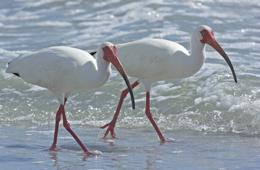 The gulf is finally moving on from the effects of the BP oil spill. Although it may no longer be in the news, scientists will have an eye on the gulf for the next 50 years or so to observe how animals will recover and adapt to the oil. Many people forget about these lasting effects of pollution and researchers are now finding how different environmental conditions can result in mutations in nature.
The gulf is finally moving on from the effects of the BP oil spill. Although it may no longer be in the news, scientists will have an eye on the gulf for the next 50 years or so to observe how animals will recover and adapt to the oil. Many people forget about these lasting effects of pollution and researchers are now finding how different environmental conditions can result in mutations in nature.Researchers at the University of Florida led by Peter Frederick studied the effect of mercury poisoning on American white ibises (Eudocimus albus). Ibises are long-legged wading birds that often feed together by poking the ground. There are known to have a long distinct beak. Researchers were testing the effects of methylmercury. Sources of mercury poising in Florida are power plants and gold mines. Mercury released by these processes is metabolized to methylmercury via a bacteria that is found in bird nests. Methylmercury (MeHg) is the most toxic form of mercury and is highly biologically available. However, the net effects of methylmercury poisoning were not well known and researchers decided to conduct an experiment.
Scientists collected 160 ibises eggs and split them into 4 groups of 20 males and 20 females. The different groups were composed of no, low, medium and high doses of mercury(0.05–0.3 ppm wet weight). Researchers experimentally exposed white ibises to 3 years of dietary MeHg concentrations once the ibises were 90 days old. They noticed that increases in the concentration of MeHg resulted in increases in male–male pairing behavior. Exposed male birds displayed less courtship behavior and even did not switch with their male pair in the following year. Frederick says that is interesting because ibises usually switch pairs the following year if mating is unsuccessful. Frederick also says that the levels of mercury administered in the experiment mimic natural conditions and believes that this phenomenon may be occurring in nature.
Frederick hypothesizes that methylmercury is causing changes in the endocrine system that results in improper levels of sex hormones (testosterone and oestradiol) in males. His main concern is that people will see the results and use on them on other species. He said, "people will read this and immediately jump to the conclusion that humans eating mercury are going to be gay. I want to be very explicit that this study has nothing to say about that."
The next step of the project is to find real examples of this happening in nature. This is just another example that shows people must be more careful with their actions as they can affect nature in a variety of ways.
Source:
Frederick, P. & Jayasena, N. Proc. R. Soc. B. doi:10.1098/rspb.2010.2189 (2010).
http://rspb.royalsocietypublishing.org/content/early/2010/11/24/rspb.2010.2189.abstract
http://www.nature.com/news/2010/101201/full/news.2010.641.html
-Himanshu Shah (3)
Right on! let a bird love whom he will! Methylmercury must do a lot of damage if it drives the bird to lose it's natural instinct to reproduce. I would think that it would be hard to find this in the wild as it won't be favorable in natrual selection. And if levels of MeHg do increase, my guess is that these cute little birds wont be around for very long :(
ReplyDeleteMeghan Nichols
Thanks for commenting Meghan. Believe it or not researchers made sure that the doses they were using were exactly the amount they found in polluted areas so I would not be surprised if scientists did find a few examples
ReplyDelete-himanshu